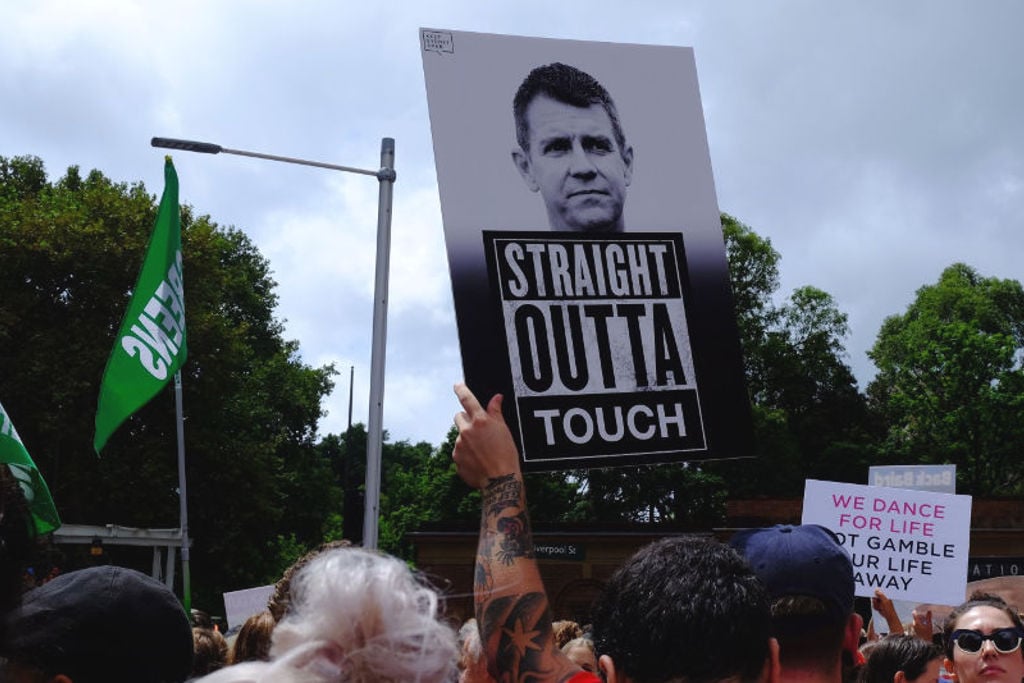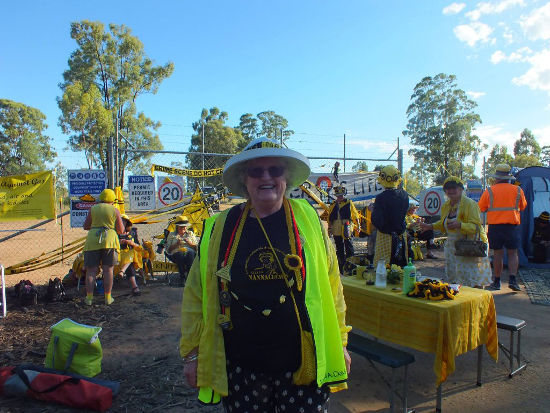The NSW Government Just Passed Laws That Can Get You Seven Years Jail For Protesting
Way to democracy, Mike Baird.

You know that classic round of pub trivia where the quizmaster reads out archaic, bizarre-sounding laws still inexplicably on the books in places like Alabama and northern England, and you have to guess whether they’re true or false? Give it ten years, tops, and a law passed by NSW Parliament last night will start cropping up in trivia rounds like that everywhere.
Continuing its stellar run of outlawing, overly regulating and generally messing with things that really don’t need government intervention, the Baird government last night passed a law dramatically increasing penalties for people who protest mining and coal-seam gas projects. Under the new laws, protesters who trespass on mining property or impede mining operations could face fines of up to $5,500 — more than mining companies are regularly fined for breaching environmental restrictions, contaminating water aquifers and illegally logging native vegetation.
Even more egregiously, protesters also face jail sentences of up to seven years — the same penalty for aggravated indecent assault or aiding a criminal’s escape, and just one year less than the NSW mandatory minimum sentence for killing someone in a one-punch assault.
Protesters often resort to direct-action methods to physically block mining and CSG projects from going ahead, including locking themselves to machinery and mining equipment, occupying digging sites, and blocking roads. In November 2014, former Wallabies captain David Pocock famously chained himself to a bulldozer for more than ten hours at a protest against the Whitehaven coal mine in western NSW (disclosure: I’ve attended a similar anti-Whitehaven protest at Maules Creek).
Locked on selfie with 5th generation farmer, @Ricklaird14, protesting Whitehaven’s new coalmine in Leard State Forest pic.twitter.com/VkgIYlZgYu
— David Pocock (@pocockdavid) November 29, 2014
Pocock was arrested and charged with entering and remaining on enclosed lands and hindering the working of mining equipment. The charges were eventually withdrawn and Pocock avoided conviction. Under the laws passed last night, though, Pocock would be about 18 months into a seven-year jail sentence by now if he were convicted, which at the very least would blow a hole in the Wallabies’ forward pack.
So would Rick Laird, a fifth-generation farmer who’s been fighting against the Whitehaven mine down the road from his western NSW farm for several years. So would NSW Greens politician Jeremy Buckingham, who avoided a conviction on Monday for jumping the fence at Rio Tinto’s Warkworth mine in the Hunter Valley and filming a protest video in August.
So would elders of the Gomeroi nation, who have been desperately trying to save Lawlers Well, a sacred site for the Gomeroi, from destruction at Whitehaven’s hands. Dozens of sacred cultural sites in and around the Whitehaven mine, including burial sites, have already been destroyed or desecrated by mining activity, despite the Gomeroi’s repeated injunctions to Whitehaven to respect traditional boundaries.
So would Bill Ryan, a 94-year-old Kokoda veteran who says he “owes it to my grandchildren” to protest mining and CSG projects that will imperil the environment and accelerate climate change.
So would members of the Knitting Nannas, an activist group made up almost entirely of old women who express their opposition to mining and CSG projects by sitting in front of them in deck chairs, making the police a cup of tea and knitting bright yellow hats and scarves.
These are the people targeted by the new penalties — people described last week, unbelievably, by NSW Resources Minister Anthony Roberts as “eco-fascists”.

Pictured: a dangerous eco-terrorist, apparently. (Image via KNAG/Twitter.)
NSW isn’t the only state where governments are answering public opposition to mining and CSG projects by curtailing the democratic right to protest. In Tasmania, similar laws passed in 2014 can see protesters fined up to $10,000 and jailed for up to four years. The original draft of those laws was so harsh it attracted concern from the United Nations.
So too have proposed anti-protest laws in Western Australia, which would impose penalties of up to two years jail and $24,000 in fines. Last month, the UN Human Rights Office said that the bill the WA government’s proposing “would criminalise a wide range of legitimate conduct” and “go against Australia’s international obligations under international human rights law”.
Unsurprisingly, backlash to this wave of anti-protest laws is quickly gathering pace. Despite pouring rain, yesterday a protest outside NSW Parliament House attracted hundreds of farmers, activists and Aboriginal elders, and legal bodies like the Law Society of NSW and the NSW Bar Association have condemned the laws as “an erosion of long-standing democratic institutions and individual rights”. Tasmania’s laws are being challenged in the High Court by former Greens leader Bob Brown, who was arrested at an anti-logging protest in January.
But the eagerness of state governments to trash fundamental democratic principles like the right to protest when it serves the interests of mining, logging and coal-seam gas companies is profoundly concerning. Whether or not CSG and mining registers as an issue on your radar is one thing. Governments responding to people who use peaceful protest as a means of political expression by jailing and financially crippling them is something else entirely.
–
Feature image via Sonia Taylor/inthemix.